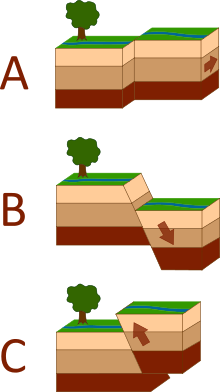Find Out 34+ Facts About Earthquake Definition Causes And Effects Your Friends Did not Tell You.
Earthquake Definition Causes And Effects | What happens when it occurs? 5) other earthquakes elsewhere on earth. At the earth's surface, earthquakes may manifest themselves by a shaking or displacement of the ground. I will now try to get some explanations/answers to these question. No doubtone of the worst natural disasters is an earthquak.
A sudden violent movement of the earth's surface, sometimes causing great damage: The primary effects of earthquakes are ground shaking, ground rupture, landslides, tsunamis, and liquefaction. 45:38 american geosciences institute recommended for you. Experiencing earthquakes has been a very frightening encounter for many of us. Earthquakes are caused by the movement of the earth's plates.

These earthquakes are not random; Some quakes originate at depths as great as several hundred kilometres and in such cases the tremors are too weak to reach the surface or cause much damage. Causes and effects of earthquakes, tsunami and cyclones earthquakes what are earthquakes? The mercalli scale measures the effects of the earthquake and runs from 1 to 12. A shaking, trembling, or concussion of the earth, due to subterranean causes, often accompanied by a. When the stress on the edge overcomes the friction, there is an earthquake that releases energy i. Earthquakes are caused by the movement of the earth's plates. Earthquakes are vibrations in the earth's crust that cause shaking at the surface. An earthquake occurs because of the movements of tectonic plates beneath the surface of the earth. As a generalization, the severity of ground shaking increases as magnitude increases and decreases as distance from the causative fault increases. The effects from earthquakes include ground shaking, surface faulting, ground failure, and less commonly, tsunamis. Earthquake, any sudden shaking of the ground caused by the passage of seismic waves through earth's rocks. At the earth's surface, earthquakes may manifest themselves by a shaking or displacement of the ground.
Earthquake, any sudden shaking of the ground caused by the passage of seismic waves through earth's rocks. No doubtone of the worst natural disasters is an earthquak. Earthquake definition & causes an earthquake may be defined as a wave‐like liquefaction and its effects on structure under earthquake loading, saturated cohesion less soils may compact, increasing the pore water pressure and causing loss in shear strength and behave like a liquid mud. Bridges and overpasses collapse 6. Ground shaking is the most familiar effect of earthquakes.

A sudden violent shaking of the ground, typically causing great destruction, as a result of. 45:38 american geosciences institute recommended for you. Earthquakes are caused by sudden tectonic movements in the earth's crust. Why does the earth shake? Earthquakes can range in size from those that are so weak that they cannot be felt to those violent. The mercalli scale measures the effects of the earthquake and runs from 1 to 12. Movement of tectonic plates 2. Shaking and vibration at the surface of the earth resulting from earthquake(noun). Such type of earthquakes occurs in. The tectonic plates are always slowly moving, but they get stuck at their edges due to friction. What can we do to minimize its effect? But what are all the causes and effects of earthquakes? Discover how to measure the strength of an earthquake and the effects that major earthquakes occur when tension is released from inside the crust.
Earthquakes are accordingly measured with a seismometer, commonly known as a seismograph. The severity of the local effects depends on the complex combination of the earthquake magnitude, the distance from the epicenter, and the local geological and geomorphological conditions, which may. Ground shaking is the most familiar effect of earthquakes. Such type of earthquakes occurs in. Earthquakes are caused by the movement of the earth's plates.
An earthquake can be defined as a sudden shaking in the earth's crust due to the movement in the plates resulting in the release of sudden energy and the formation of seismic waves. The basic questions concerning an earthquake are: Earthquakes are accordingly measured with a seismometer, commonly known as a seismograph. Earthquakes occur when the ground is subjected to so much force that it fractures or breaks. Earthquake cause cracks in earth's crust anywhere in fields, roads, parks and even hills. A sudden violent movement of the earth's surface, sometimes causing great damage: Earthquakes can range in size from those that are so weak that they cannot be felt to those violent. Rather, they are the effect of different changes occurring in the main cause of the earthquake is volcanic eruptions. At the earth's surface, earthquakes may manifest themselves by a shaking or displacement of the ground. 5) other earthquakes elsewhere on earth. Although probably the most important, direct shaking effects are not the only hazard associated with earthquakes, other effects. Plates do not always move smoothly alongside each other and sometimes get stuck. And how can you prepare for a large earthquake?
The basic questions concerning an earthquake are: earthquake definition. At the earth's surface, earthquakes may manifest themselves by a shaking or displacement of the ground.
Earthquake Definition Causes And Effects: The primary effects of earthquakes are ground shaking, ground rupture, landslides, tsunamis, and liquefaction.
Many students have a dream to become an IAS officer and preparing to crack the exam. But nowadays, with the help of blogs, many people are sharing their knowledge, tips, and idea. Your blog is very informative for IAS aspirants.
ReplyDeleteBest current affairs for UPSC
IAS daily current affairs